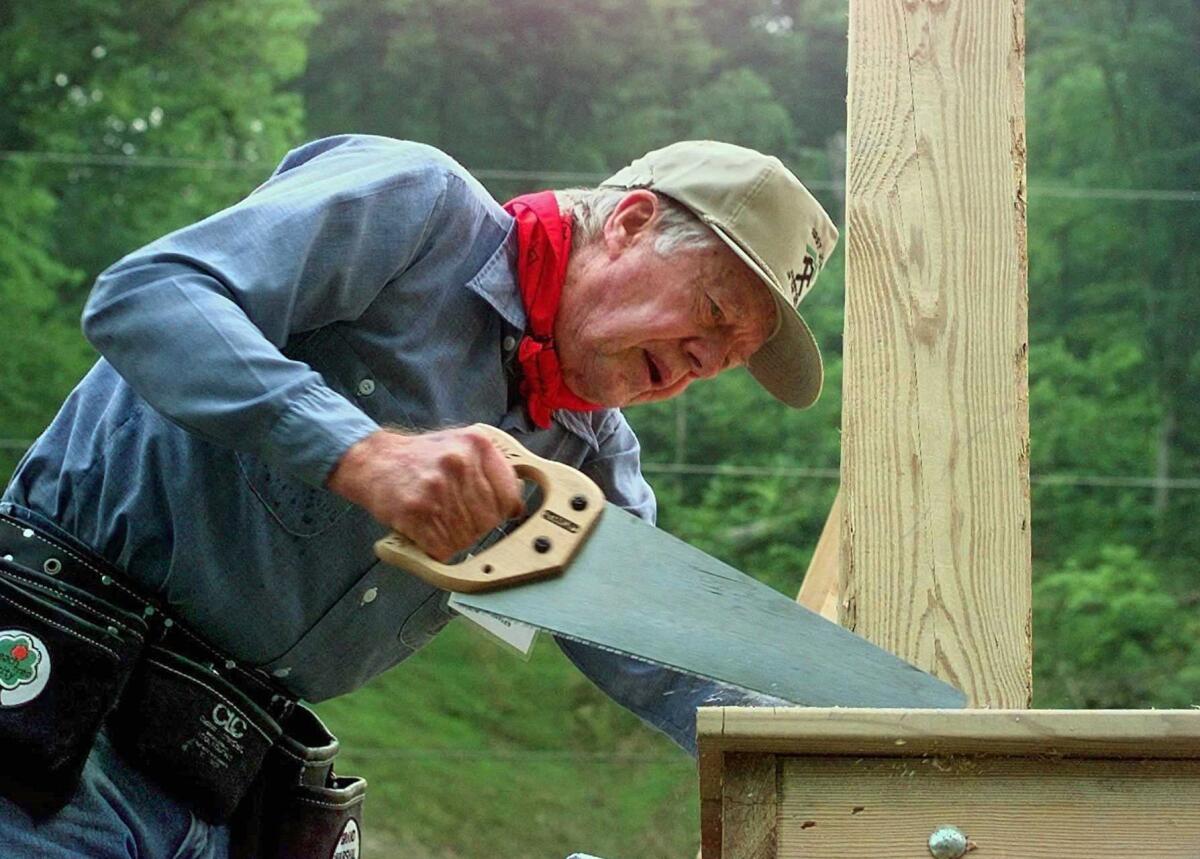Opinion: As Carter fights cancer, his post-White House years may set his legacy

Former President Carter works on a Habitat for Humanity home in Pikeville, Ky., 1997. On Wednesday, Carter announced he has cancer and will undergo treatment at an Atlanta hospital.
- Share via
If you go to the website for The Carter Center in Atlanta, you’ll see at the top of the home page a simple slogan: “Waging peace. Fighting disease. Building hope.” That middle phrase is figuring pretty large after former President Carter’s announcement Wednesday that “I have cancer that now is in other parts of my body,” and that he would, at the age of 90, soon start receiving treatment.
The third phrase comes into play too: Here’s hoping the treatment is effective and that Carter overcomes such a serious disease. Yet the first phrase about “waging peace” may, from the perspective of history and legacy, come to define a man who is regarded as a middling president but who has earned wide admiration for post-White House years spent living his convictions.
Carter isn’t our oldest former president – George H.W. Bush, at age 91, has him beat by a few months. But at 35 years and counting, Carter has enjoyed a longer post-presidency than any of the other 41 former presidents – Herbert Hoover comes second with 32 years. (Barack Obama, still in office, is the nation’s 44th president, but Grover Cleveland served two non-consecutive terms so gets counted as two administrations, thus we have one fewer total presidents than presidencies.)
Carter has made good use of that time, and has gone a long way in rehabilitating his reputation – his approval rating as he turned the Oval Office over after one term to Ronald Reagan was 34%. In a poll last year, Gallup found that of the four living ex-presidents, Carter’s favorable rating was the lowest at 52%, one point behind George W. Bush – though with a +/-4 point margin of error, they were statistically tied. As were Bill Clinton and the elder Bush, at 64% and 63% respectively. But as Gallup notes, 16% of the respondents said they didn’t know enough about Carter to have an opinion, compared with single digit “I don’t knows” for the others.
And this is where demographics crops up. Carter left office in 1981, which means that nearly half of the current U.S. population wasn’t even born yet. Those who were old enough to vote in the 1980 election that ousted him account for about one in three of the current population.
So Carter has had a bit of a tabula rasa to work with, which he has filled with annual home-building projects for Habitat for Humanity, monitoring elections around the world (he cut short a monitoring trip to Guyana in May, his 39th, because he wasn’t feeling well, though it’s unclear whether that ailment was tied to recent diagnosis), serving as a mediator or fact-finder in disputes around the world, publishing 27 books (he published two others before becoming president), as well as criticizing George W. Bush over his decision to invade Iraq, and Obama over human rights issues and the use of drones to kill civilians.
All of which has earned him the support of a lot of political progressives, though it has done little to soften the views of Republicans who believe the Reagan presidency saved the nation.
But you have to admire someone who has dedicated so much of his own life to helping others, in ways both large and small. History isn’t done with Carter yet, but his post-White House life may well be the one he was best-suited to lead.
Follow Scott Martelle on Twitter @smartelle.
More to Read
A cure for the common opinion
Get thought-provoking perspectives with our weekly newsletter.
You may occasionally receive promotional content from the Los Angeles Times.










